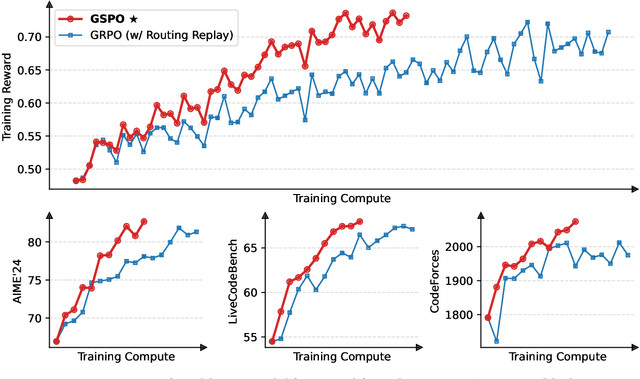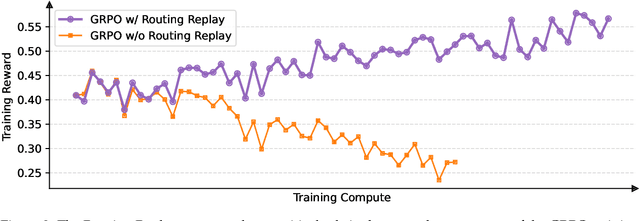Bowen Yu
additional authors not shown
Outcome Accuracy is Not Enough: Aligning the Reasoning Process of Reward Models
Feb 04, 2026Abstract:Generative Reward Models (GenRMs) and LLM-as-a-Judge exhibit deceptive alignment by producing correct judgments for incorrect reasons, as they are trained and evaluated to prioritize Outcome Accuracy, which undermines their ability to generalize during RLHF. We introduce Rationale Consistency, a fine-grained metric that quantifies the alignment between the model's reasoning process and human judgment. Our evaluation of frontier models reveals that rationale consistency effectively discriminates among state-of-the-art models and detects deceptive alignment, while outcome accuracy falls short in both respects. To mitigate this gap, we introduce a hybrid signal that combines rationale consistency with outcome accuracy for GenRM training. Our training method achieves state-of-the-art performance on RM-Bench (87.1%) and JudgeBench (82%), surpassing outcome-only baselines by an average of 5%. Using RM during RLHF, our method effectively improves performance as demonstrated on Arena Hard v2, notably yielding a 7% improvement in creative writing tasks. Further analysis confirms that our method escapes the deceptive alignment trap, effectively reversing the decline in rationale consistency observed in outcome-only training.
PLawBench: A Rubric-Based Benchmark for Evaluating LLMs in Real-World Legal Practice
Jan 23, 2026Abstract:As large language models (LLMs) are increasingly applied to legal domain-specific tasks, evaluating their ability to perform legal work in real-world settings has become essential. However, existing legal benchmarks rely on simplified and highly standardized tasks, failing to capture the ambiguity, complexity, and reasoning demands of real legal practice. Moreover, prior evaluations often adopt coarse, single-dimensional metrics and do not explicitly assess fine-grained legal reasoning. To address these limitations, we introduce PLawBench, a Practical Law Benchmark designed to evaluate LLMs in realistic legal practice scenarios. Grounded in real-world legal workflows, PLawBench models the core processes of legal practitioners through three task categories: public legal consultation, practical case analysis, and legal document generation. These tasks assess a model's ability to identify legal issues and key facts, perform structured legal reasoning, and generate legally coherent documents. PLawBench comprises 850 questions across 13 practical legal scenarios, with each question accompanied by expert-designed evaluation rubrics, resulting in approximately 12,500 rubric items for fine-grained assessment. Using an LLM-based evaluator aligned with human expert judgments, we evaluate 10 state-of-the-art LLMs. Experimental results show that none achieves strong performance on PLawBench, revealing substantial limitations in the fine-grained legal reasoning capabilities of current LLMs and highlighting important directions for future evaluation and development of legal LLMs. Data is available at: https://github.com/skylenage/PLawbench.
Renormalization Group Guided Tensor Network Structure Search
Dec 31, 2025Abstract:Tensor network structure search (TN-SS) aims to automatically discover optimal network topologies and rank configurations for efficient tensor decomposition in high-dimensional data representation. Despite recent advances, existing TN-SS methods face significant limitations in computational tractability, structure adaptivity, and optimization robustness across diverse tensor characteristics. They struggle with three key challenges: single-scale optimization missing multi-scale structures, discrete search spaces hindering smooth structure evolution, and separated structure-parameter optimization causing computational inefficiency. We propose RGTN (Renormalization Group guided Tensor Network search), a physics-inspired framework transforming TN-SS via multi-scale renormalization group flows. Unlike fixed-scale discrete search methods, RGTN uses dynamic scale-transformation for continuous structure evolution across resolutions. Its core innovation includes learnable edge gates for optimization-stage topology modification and intelligent proposals based on physical quantities like node tension measuring local stress and edge information flow quantifying connectivity importance. Starting from low-complexity coarse scales and refining to finer ones, RGTN finds compact structures while escaping local minima via scale-induced perturbations. Extensive experiments on light field data, high-order synthetic tensors, and video completion tasks show RGTN achieves state-of-the-art compression ratios and runs 4-600$\times$ faster than existing methods, validating the effectiveness of our physics-inspired approach.
Seedance 1.5 pro: A Native Audio-Visual Joint Generation Foundation Model
Dec 23, 2025Abstract:Recent strides in video generation have paved the way for unified audio-visual generation. In this work, we present Seedance 1.5 pro, a foundational model engineered specifically for native, joint audio-video generation. Leveraging a dual-branch Diffusion Transformer architecture, the model integrates a cross-modal joint module with a specialized multi-stage data pipeline, achieving exceptional audio-visual synchronization and superior generation quality. To ensure practical utility, we implement meticulous post-training optimizations, including Supervised Fine-Tuning (SFT) on high-quality datasets and Reinforcement Learning from Human Feedback (RLHF) with multi-dimensional reward models. Furthermore, we introduce an acceleration framework that boosts inference speed by over 10X. Seedance 1.5 pro distinguishes itself through precise multilingual and dialect lip-syncing, dynamic cinematic camera control, and enhanced narrative coherence, positioning it as a robust engine for professional-grade content creation. Seedance 1.5 pro is now accessible on Volcano Engine at https://console.volcengine.com/ark/region:ark+cn-beijing/experience/vision?type=GenVideo.
PCMind-2.1-Kaiyuan-2B Technical Report
Dec 08, 2025Abstract:The rapid advancement of Large Language Models (LLMs) has resulted in a significant knowledge gap between the open-source community and industry, primarily because the latter relies on closed-source, high-quality data and training recipes. To address this, we introduce PCMind-2.1-Kaiyuan-2B, a fully open-source 2-billion-parameter model focused on improving training efficiency and effectiveness under resource constraints. Our methodology includes three key innovations: a Quantile Data Benchmarking method for systematically comparing heterogeneous open-source datasets and providing insights on data mixing strategies; a Strategic Selective Repetition scheme within a multi-phase paradigm to effectively leverage sparse, high-quality data; and a Multi-Domain Curriculum Training policy that orders samples by quality. Supported by a highly optimized data preprocessing pipeline and architectural modifications for FP16 stability, Kaiyuan-2B achieves performance competitive with state-of-the-art fully open-source models, demonstrating practical and scalable solutions for resource-limited pretraining. We release all assets (including model weights, data, and code) under Apache 2.0 license at https://huggingface.co/thu-pacman/PCMind-2.1-Kaiyuan-2B.
Reinforcement learning-guided optimization of critical current in high-temperature superconductors
Oct 25, 2025Abstract:High-temperature superconductors are essential for next-generation energy and quantum technologies, yet their performance is often limited by the critical current density ($J_c$), which is strongly influenced by microstructural defects. Optimizing $J_c$ through defect engineering is challenging due to the complex interplay of defect type, density, and spatial correlation. Here we present an integrated workflow that combines reinforcement learning (RL) with time-dependent Ginzburg-Landau (TDGL) simulations to autonomously identify optimal defect configurations that maximize $J_c$. In our framework, TDGL simulations generate current-voltage characteristics to evaluate $J_c$, which serves as the reward signal that guides the RL agent to iteratively refine defect configurations. We find that the agent discovers optimal defect densities and correlations in two-dimensional thin-film geometries, enhancing vortex pinning and $J_c$ relative to the pristine thin-film, approaching 60\% of theoretical depairing limit with up to 15-fold enhancement compared to random initialization. This RL-driven approach provides a scalable strategy for defect engineering, with broad implications for advancing HTS applications in fusion magnets, particle accelerators, and other high-field technologies.
Qwen3Guard Technical Report
Oct 16, 2025Abstract:As large language models (LLMs) become more capable and widely used, ensuring the safety of their outputs is increasingly critical. Existing guardrail models, though useful in static evaluation settings, face two major limitations in real-world applications: (1) they typically output only binary "safe/unsafe" labels, which can be interpreted inconsistently across diverse safety policies, rendering them incapable of accommodating varying safety tolerances across domains; and (2) they require complete model outputs before performing safety checks, making them fundamentally incompatible with streaming LLM inference, thereby preventing timely intervention during generation and increasing exposure to harmful partial outputs. To address these challenges, we present Qwen3Guard, a series of multilingual safety guardrail models with two specialized variants: Generative Qwen3Guard, which casts safety classification as an instruction-following task to enable fine-grained tri-class judgments (safe, controversial, unsafe); and Stream Qwen3Guard, which introduces a token-level classification head for real-time safety monitoring during incremental text generation. Both variants are available in three sizes (0.6B, 4B, and 8B parameters) and support up to 119 languages and dialects, providing comprehensive, scalable, and low-latency safety moderation for global LLM deployments. Evaluated across English, Chinese, and multilingual benchmarks, Qwen3Guard achieves state-of-the-art performance in both prompt and response safety classification. All models are released under the Apache 2.0 license for public use.
RMTBench: Benchmarking LLMs Through Multi-Turn User-Centric Role-Playing
Jul 27, 2025Abstract:Recent advancements in Large Language Models (LLMs) have shown outstanding potential for role-playing applications. Evaluating these capabilities is becoming crucial yet remains challenging. Existing benchmarks mostly adopt a \textbf{character-centric} approach, simplify user-character interactions to isolated Q&A tasks, and fail to reflect real-world applications. To address this limitation, we introduce RMTBench, a comprehensive \textbf{user-centric} bilingual role-playing benchmark featuring 80 diverse characters and over 8,000 dialogue rounds. RMTBench includes custom characters with detailed backgrounds and abstract characters defined by simple traits, enabling evaluation across various user scenarios. Our benchmark constructs dialogues based on explicit user motivations rather than character descriptions, ensuring alignment with practical user applications. Furthermore, we construct an authentic multi-turn dialogue simulation mechanism. With carefully selected evaluation dimensions and LLM-based scoring, this mechanism captures the complex intention of conversations between the user and the character. By shifting focus from character background to user intention fulfillment, RMTBench bridges the gap between academic evaluation and practical deployment requirements, offering a more effective framework for assessing role-playing capabilities in LLMs. All code and datasets will be released soon.
A Multi-Agent System for Information Extraction from the Chemical Literature
Jul 27, 2025Abstract:To fully expedite AI-powered chemical research, high-quality chemical databases are the cornerstone. Automatic extraction of chemical information from the literature is essential for constructing reaction databases, but it is currently limited by the multimodality and style variability of chemical information. In this work, we developed a multimodal large language model (MLLM)-based multi-agent system for automatic chemical information extraction. We used the MLLM's strong reasoning capability to understand the structure of complex chemical graphics, decompose the extraction task into sub-tasks and coordinate a set of specialized agents to solve them. Our system achieved an F1 score of 80.8% on a benchmark dataset of complex chemical reaction graphics from the literature, surpassing the previous state-of-the-art model (F1 score: 35.6%) by a significant margin. Additionally, it demonstrated consistent improvements in key sub-tasks, including molecular image recognition, reaction image parsing, named entity recognition and text-based reaction extraction. This work is a critical step toward automated chemical information extraction into structured datasets, which will be a strong promoter of AI-driven chemical research.
Group Sequence Policy Optimization
Jul 24, 2025


Abstract:This paper introduces Group Sequence Policy Optimization (GSPO), our stable, efficient, and performant reinforcement learning algorithm for training large language models. Unlike previous algorithms that adopt token-level importance ratios, GSPO defines the importance ratio based on sequence likelihood and performs sequence-level clipping, rewarding, and optimization. We demonstrate that GSPO achieves superior training efficiency and performance compared to the GRPO algorithm, notably stabilizes Mixture-of-Experts (MoE) RL training, and has the potential for simplifying the design of RL infrastructure. These merits of GSPO have contributed to the remarkable improvements in the latest Qwen3 models.
 Add to Chrome
Add to Chrome Add to Firefox
Add to Firefox Add to Edge
Add to Edge